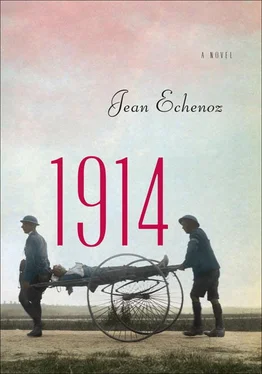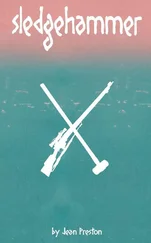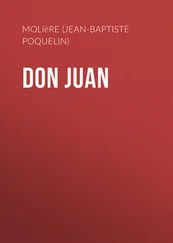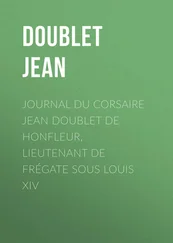After that everything seemed just about over. As the smoke and dust gradually cleared from the trench, a kind of quiet returned, even though other massive detonations still sounded solemnly all around but at a distance, as if in an echo. Those who’d been spared stood up fairly spattered with bits of military flesh, dirt-crusted scraps rats were already snatching off them and fighting over among the bodily remains here and there: a head without its lower jaw, a hand wearing its wedding ring, a single foot in its boot, an eye.
So silence seemed intent on returning—when a tardy piece of shrapnel showed up, from who knows where and one wonders how, as clipped as a postscript: an iron fragment shaped like a polished Neolithic ax, smoking hot, the size of a man’s hand, fully as sharp as a large shard of glass. Without even a glance at the others, as if it were settling a personal score, it sped directly toward Anthime as he was getting to his feet and, willy-nilly, lopped off his right arm clean as a whistle, just below the shoulder.
Five hours later, everybody at the field hospital congratulated Anthime, showing him how they envied him this “good wound,” one of the best there was: serious, of course, crippling, but not more than many others, really, and coveted by all as one of those that ship you away forever from the front. Such was the enthusiasm of his comrades propped up on their elbows at the edge of their cots, waving their kepis—at least those who weren’t too damaged to wave—that Anthime almost didn’t dare complain or weep from pain, or lament the loss of his arm, the disappearance of which he was not actually fully aware. Not fully aware either, in truth, of the pain or the state of the world in general, no more than he could envisage—looking at the others without seeing them—never being himself able ever again to lean on his elbows except on one side. Out of his coma and then out of what served as a surgical unit, his eyes open but focused on nothing, it simply seemed to him— although he didn’t really know why—that given the laughter, there must be some reason to be happy. Reason enough for him to feel almost ashamed of his condition, again without fully understanding why: so as if he were reacting automatically to the other patients’ applause, to join in the merriment he gave a laugh that came out like a long spasm and sounded like braying, which shut everyone up instanter. A serious shot of morphine then returned him to the absence of all things.
And six months after that, the folded sleeve of his jacket affixed to his right side with a safety pin, another pin anchoring a new Croix de Guerre on the other side of his chest, Anthime was strolling along a quay by the Loire. It was Sunday again and he’d passed his remaining arm through the right arm of Blanche, who, with her left hand, was pushing a carriage containing Juliette, asleep. Anthime was in black, Blanche in mourning as well, with everything around them blending rather well with that color in touches of gray, chestnut brown, hunter green, save for the tarnished gilding on the shops, which gleamed dully in the early June sunshine. Anthime and Blanche were not saying much, except to mention briefly the news in the papers. At least you’ve avoided Verdun, [11] Verdun: The German hope for a swift victory when they invaded France had been stymied by Russian offensives on the east and the French victory outside Paris in “the Miracle of the Marne,” the desperate counterattack in September 1914 that broke the monthlong German offensive. After the invaders withdrew to the northeast, the Western Front solidified into a four-year war of attrition in the trenches. Hoping to end this stalemate, the Germans mounted a massive offensive at Verdun, which was now a salient on the front lines, open to attack from three sides. The Battle of Verdun (February 21–December 18, 1916) found the French initially unprepared, but German gains were slowed by French reinforcements, and both sides incurred heavy losses as the German advance bogged down. Partly to relieve German pressure on Verdun, the Allies launched their own offensive on the Somme on July 1, forcing Germany to divert men and matériel there. The Battle of Verdun dragged on until the end of the year, as the French clawed back their lost ground. Modern estimates put the number of dead and wounded at close to a million men. After eleven months, the longest and bloodiest battle of World War I ended with no real advantage to either side.
she had just said, but he had not thought it advisable to reply.
After almost two years of fighting, with increased recruitment a constant drain on the country, there were even fewer people in the streets, whether it was Sunday or not. And not even many women or children anymore, given the cost of living and the difficulties in shopping, because women received only the wartime allowance at best and in the absence of husbands and brothers, many had had to find work: posting bills, delivering mail, punching tickets, or driving locomotives, when they didn’t wind up in factories, armaments plants in particular. No longer going to school, the children had plenty to keep them busy too: much in demand from the age of eleven on, they replaced their elders in businesses as well as in the fields outside the city, where they worked horses, threshed grain, cared for livestock. That left mostly the elderly, the marginal, a few invalids like Anthime, and some dogs on leashes or on the loose.
One of those strays, in the excitement of its sexual arousal by another mutt across the street on the Quai de la Fosse, ran clumsily into a wheel of the baby carriage, which teetered threateningly for an instant until a swift kick from Blanche’s high heel sent the culprit off squealing. After making sure that the young woman had the situation in hand and that his niece had not awakened, Anthime watched the woebegone animal—now tacking from one curb to the other, its erection maintained but useless now that its heart’s desire had vanished during the carriage incident—until it disappeared at the corner of the Rue de la Verrerie.
ANIMALS, WELL, ANTHIME HAD seen a lot of them, of all sorts, during those five hundred days. Because although war prefers cities—besieging, invading, bombing, burning—it is waged in large part in the countryside as well, where beasts are simply a given.
First off, the useful animals: those one works or eats or both, currently abandoned by peasants fleeing their farms turned into combat zones, their buildings ablaze, their fields cratered by shells, their poultry and livestock left behind. In theory, the territorial soldiers were responsible for rounding up these creatures, but that was easier said than done with unclaimed cattle, soon eager to return to a wild state that quickly turned them touchy, especially the bulls, vindictive and impossible to catch. Nor was it a small job for the territorials, even those with a rural background, to gather all the sheep gone roaming along roads in ruins, the wandering pigs, the ducks, chickens, and roosters left to their own devices, the rabbits without any fixed domicile.
These now itinerant species could at least serve, on occasion, to vary the monotonous diet of the troops. Wine was no longer a problem, since it was now widely distributed by the quartermaster corps along with brandy, for the high command was increasingly convinced that inebriating its soldiers helped bolster their courage and, above all, reduce their awareness of their condition. A chance encounter one fine day with a disoriented goose, on the other hand, made a small change from yesterday’s bread, cold soup, and tinned beef, and every animal so recuperated thus became a potential feast. Sometimes, driven by hunger and professionally assisted by Padioleau, who enjoyed exercising his butchering skills, Arcenel and Bossis would even carve a few ribs out of a living ox, then leave him to manage on his own. Foragers went so far as to slaughter and devour without qualm idle, bewildered horses, now deprived of their purpose in life, in any case, and upset at no longer having barges to haul along the canal of the Meuse River.
Читать дальше









